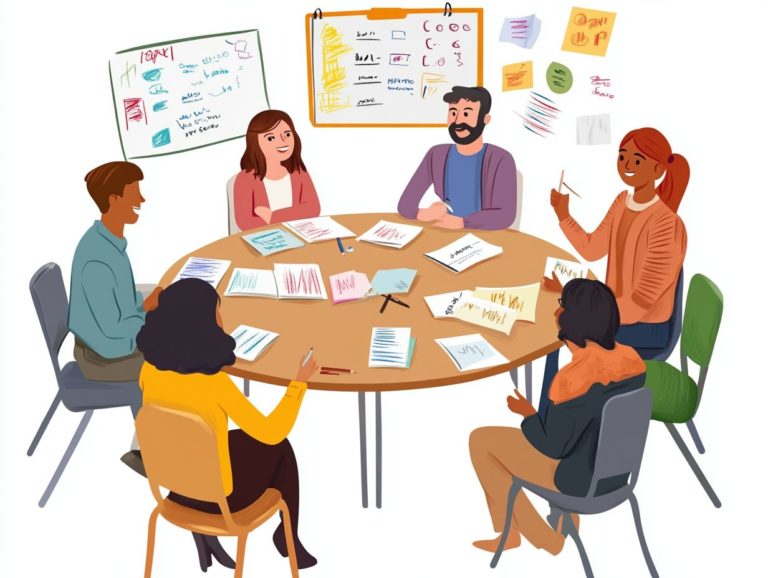how to use literature in language learning
Literature offers a rich mix of language, culture, and emotion. It’s an invaluable resource for language learners like you.
This article explores how to choose the right literary works to enhance your language skills. You’ll learn about reading comprehension and writing fluency.
Discover practical strategies for using literature in your lessons. You’ll also assess your progress and gain insights into cultural nuances.
Join us on this journey to uncover the benefits and challenges of using literature in language learning!
Contents
- Key Takeaways:
- Benefits and Challenges
- Choosing the Right Literature for Language Learning
- Incorporating Literature into Language Lessons
- Strategies and Activities
- Using Literature to Improve Language Skills
- Assessing Progress with Literature in Language Learning
- Expanding Cultural Knowledge through Literature
- Frequently Asked Questions
- What is the role of literature in language learning?
- How do I choose appropriate literature for language learning?
- What are the benefits of using literature in language learning?
- How can I integrate literature into language learning activities?
- Can literature be used in all language levels?
- Where can I find resources for using literature in language learning?
Key Takeaways:

Literature is a dynamic resource for language learning. It helps improve reading, writing, speaking, and listening skills.
When you include literature in lessons, consider learners’ interests and language levels to keep them engaged.
Literature also broadens cultural knowledge by exposing learners to different perspectives.
Benefits and Challenges
Using literature in language learning offers great benefits and some challenges. Literature enhances comprehension, vocabulary, and cultural awareness.
However, you may face challenges in selecting suitable texts and keeping students engaged. Addressing diverse learning needs is also important.
Choosing the Right Literature for Language Learning
Selecting the right literature boosts student engagement and understanding in the classroom. As an educator, consider your students’ proficiency and interests.
Understanding the cultural context of texts enriches the learning environment. It encourages deeper interactions among students.
Criteria for Selection
When choosing literature, consider cultural relevance, language complexity, and student engagement. Analyze themes and vocabulary to align your choices with teaching methods.
Prioritizing cultural relevance ensures texts resonate with students experiences, promoting inclusivity.
Language complexity allows you to tailor readings to different levels, ensuring all students can engage comfortably.
Engaging literature encourages active participation in discussions, leading to a richer understanding.
Incorporating Literature into Language Lessons

Incorporating literature into lessons enhances the classroom experience. It fosters student-centered learning and uses authentic materials.
Explore strategies like creative activities and discussions that let students connect personally with texts. This approach sharpens language skills and deepens cultural understanding.
Strategies and Activities
Effective strategies for incorporating literature into your language learning can significantly boost engagement and comprehension. Techniques like interactive reading sessions and group discussions allow you to dive deep into texts and express your unique interpretations.
By utilizing a variety of activities, you can cater to diverse learning styles and foster active participation in the classroom.
For example, if you’re a kinesthetic learner, role-playing scenes from a story can really draw you in. Visual learners might find creating storyboards to illustrate key plot points particularly beneficial.
Embracing technology, such as online discussions or multimedia presentations, speaks to digital natives and enhances peer collaboration. These interactive methods enhance understanding and connect your personal experiences with literature.
As you explore character motivations or thematic elements through group projects, you ll sharpen your critical thinking and analytical skills, transforming literature into a vibrant exploration of ideas and emotions.
Using Literature to Improve Language Skills
Dive into literature and watch your language skills soar! Incorporating literature into your language learning journey can dramatically enhance your skills in reading, writing, speaking, and listening. Engaging with literary texts offers a treasure trove of rich vocabulary and captivating narratives that elevate your language proficiency.
This comprehensive approach sharpens your communication abilities and enriches your interpretation skills, allowing you to connect more deeply with the language.
Reading, Writing, Speaking, and Listening
Reading, writing, speaking, and listening are interconnected language skills that you can effectively cultivate through literature in the classroom. Engaging with literary texts offers rich content for comprehension activities while igniting your imagination for creative writing assignments.
When discussing literature, you enhance your speaking skills and foster active listening and critical thinking. Immersing yourself in diverse genres allows you to practice reading comprehension while identifying themes and character development.
Writing activities can involve responding to prompts inspired by your readings or crafting alternative endings to stories. Participating in group discussions or literature circles enables you to share insights and encourages articulate speaking while developing the ability to listen and respond thoughtfully.
This holistic approach deepens your comprehension and strengthens your language skills in a meaningful context, laying a solid foundation for lifelong learning.
Assessing Progress with Literature in Language Learning

Evaluate your progress in language learning by exploring literature. Effective assessment techniques provide valuable insights into your language proficiency, enabling educators to tailor their teaching strategies to better align with your needs.
By utilizing literature as a foundation for assessment, educators can establish meaningful feedback loops that enhance your thinking skills and enrich your learning experience.
Start your literary journey today!
Evaluating Language Proficiency
Evaluating language proficiency through literature requires engaging in a thoughtful analysis of your abilities in comprehension, expression, and interaction with texts.
By implementing structured assessment methods, you can gain valuable insights into your language skills, enabling you to make informed decisions about your educational journey. This process identifies areas to improve and showcases your strengths in language use.
Utilizing various literary forms such as poetry, prose, and drama allows educators to gauge how well you interpret themes, identify literary devices (tools that writers use to create effects in their writing), and articulate your personal responses.
Incorporating discussions and written reflections fosters a deeper understanding and enhances your expressive capabilities. Regular evaluations create a feedback loop that tailors ongoing support to your individual needs, leading to sustained development.
By systematically analyzing these aspects, educators can adapt their teaching strategies, ensuring that language instruction remains relevant, impactful, and aligned with your evolving linguistic competencies.
Expanding Cultural Knowledge through Literature
Expanding your cultural knowledge through literature is a fantastic way to dive into new cultures! Engaging with a range of literary texts helps you discover themes that connect with your life while challenging your understanding of the world.
This cultural enrichment enhances your language skills and builds empathy, elevating your overall educational journey.
Exploring Different Perspectives
Exploring different perspectives through literature allows you to engage with cultural narratives and experiences that broaden your understanding of the world around you.
By analyzing diverse texts, you can appreciate the richness of various cultures and their invaluable contributions to society. This exploration enhances your comprehension and critical thinking skills and builds empathy and connection with others.
Take novels like Chimamanda Ngozi Adichie s Americanah and Khaled Hosseini s The Kite Runner, for instance. These works invite you to delve into the complexities of identity, displacement, and belonging. They expose you to the myriad struggles and triumphs faced by individuals from different backgrounds.
Engaging with such texts cultivates deeper cultural awareness and challenges preconceived notions, ultimately encouraging meaningful dialogue and understanding among your peers.
Literature acts as a gateway for exploring both historical and contemporary issues, enabling you to connect fictional experiences with real-world contexts. This enriches your educational journey and fosters your development as a compassionate global citizen.
Frequently Asked Questions

Explore the world of literature!
What is the role of literature in language learning?
Literature is crucial for language learning as it exposes learners to new vocabulary, sentence structures, and cultural contexts. It also improves reading, writing, listening, and speaking skills.
How do I choose appropriate literature for language learning?
When selecting literature for language learning, consider the learners’ proficiency level, interests, and cultural background. You can also choose texts rich in cultural elements to enhance learning.
What are the benefits of using literature in language learning?
Using literature in language learning has numerous benefits, such as improving language proficiency, expanding cultural knowledge, developing critical thinking skills, and fostering a love for reading.
How can I integrate literature into language learning activities?
There are various ways to incorporate literature into language learning, including reading comprehension exercises, role-plays, discussions, and creative writing tasks. You can also use digital tools like audiobooks and online quizzes.
Can literature be used in all language levels?
Yes, literature can be adapted and used in language learning for all proficiency levels. For beginners, simplified versions of classic texts or short stories can be used, while advanced learners can handle more complex texts.
Dive into captivating stories today and watch your language skills flourish!
Where can I find resources for using literature in language learning?
Many resources are available for using literature in language learning. You can explore textbooks, online databases, and materials made by teachers.
Connecting with other language teachers or attending workshops can also provide great ideas and inspiration.






